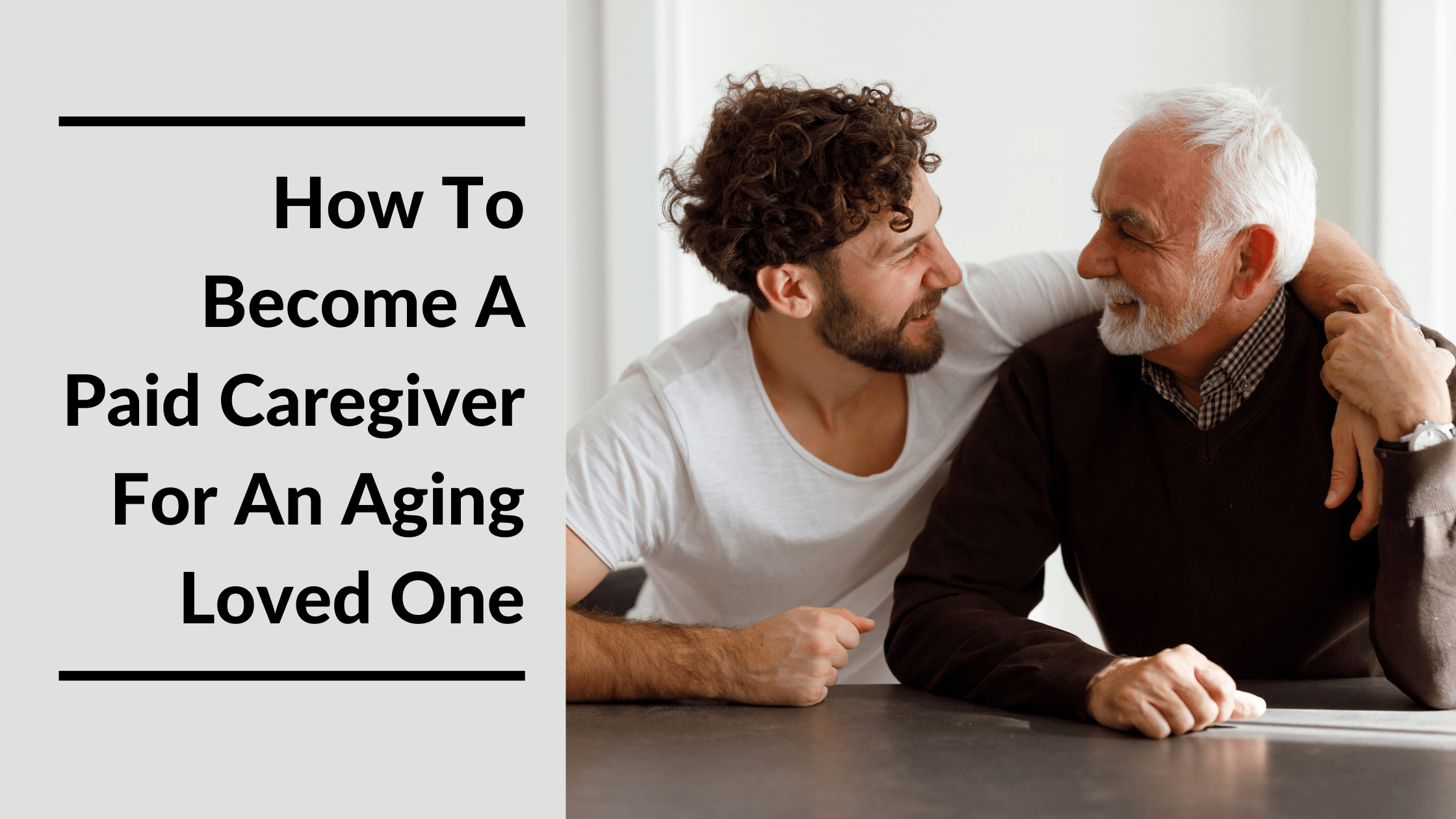
Many wonder if they can receive financial assistance as a paid caregiver. Here are a few options that might help you to receive compensation for your caregiving responsibilities.
Updated December 15, 2022
Can You Become A Paid Caregiver For A Family Member?
Have you ever asked yourself, “Can I get paid for caring for my mom and dad?” If you have, you’re not alone. Many wonder if they can become a paid caregiver for a family member. After all, financial assistance can go a long way to offset the economic impact of caregiving, which is not insignificant.
The number of informal caregivers is rising. They also care for loved ones with progressively complex medical and care needs. Unfortunately, family caregivers are often the ones to shoulder this cost.
AARP’s 2021 Caregiving Out-of-Pocket Costs Study highlights the concerning reality of the average family caregiver’s financial circumstances:
- Family caregivers spend 26% of their income on caregiving.
- Annual out-of-pocket expenses cost family caregivers an average of $7,242.
- About 80% of caregivers regularly pay for out-of-pocket costs related to their role.
- 17% of caregiver spending covered medical expenses (such as health care, therapists, homecare, or medical equipment).
- About 50% of caregivers used their own money for household costs (i.e., 30% paid their loved one’s rent or mortgage, and 21% financed home modifications).
Although becoming a paid caregiver for your aging parent at home is possible, it can also be complicated. But there are ways to alleviate your financial burden. Here are a few options that might help you to receive compensation for your caregiving responsibilities.
Government Programs For Paid Caregivers
Your options to become a paid caregiver will differ depending on your loved one’s state and situation. This section will help you learn how to receive compensation for your time and labor and discover programs to help with caregiving costs.
Veterans’ Benefits
Veterans and their families have various benefits, some of which can help offset the cost of home care. For example, the veterans’ pension was created to support vets living on fixed- or low-income and has three levels of financial relief:
- Basic pension: For lowest-income veterans with very few assets.
- Housebound pension: For low-income individuals with a disability who are either unable to leave their home or have significant difficulty doing so.
- Aid and Attendance (A&A) pension: For veterans with few assets and limited income who need assistance with activities of daily living (ADLs).
Pensions are tax-exempt benefits allocated according to the veteran’s income and assets. Additionally, the recipient is free to use the money how they want. For example, if you care for a loved one who is the spouse of a deceased veteran, they may be eligible for this benefit.
For more information about these and other paid caregiver benefits, check out the US Department of Veteran Affairs and Veterans Benefits Guide.

Home and Community-Based Service Waivers
Low-income seniors may qualify for Medicaid, which offers health coverage for hospital care and physician’s appointments. Additionally, it can assist with the expense of in-home, personal, and long-term care. There is a long list of qualifications, but if your loved one meets them, Medicaid can significantly offset some costs associated with eldercare.
Medicaid also offers Home and Community-Based Services (HCBS) waivers. Also called 1915(c) waivers, this benefit provides state coverage for your loved one’s care, whether at home or in their community.
Like veterans’ benefits, waiver programs differ depending on the state. These programs also have different names depending on where you live. However, many are affiliated with your state’s Cash and Counseling Programs. You may find that there is a long waiting period if you decide to enroll.
Cash and Counseling Programs
Cash and Counseling Programs are a Medicaid benefit that offers recipients a monthly stipend to pay for services from a list of approved care providers. Elders can use these payments to hire a professional caregiver or compensate you or anyone else for your time.
Besides a Personal Care Agreement, this program is one of the most direct ways to become a paid caregiver. Medicaid will reimburse you for your loved one’s care based on its approved hourly rate, which varies by state. However, the average pay ranges from $9 to $19.25 an hour.
Depending on your state, Cash and Counseling Programs might be called consumer-directed care, in-home supportive services, or something similar. Since Medicaid is a state and federal operation, restrictions and eligibility will vary.
Find more information by calling your state’s Medicaid agency or visiting Medicaid.gov.
State Plan Personal Care Services
Medicaid can extend coverage for personal care expenses through the Medicaid State Plan. As an entitlement program, regular Medicaid offers benefits to anyone who qualifies. And unlike Waivers, there is no waiting period. However, it’s essential to understand that some states may choose to provide personal care services via Community First Choice (CFC) program.
Suppose your loved one participates in this program. In that case, they can designate you as their primary care provider so you can become a paid caregiver. Your compensation will depend on Medicaid’s accepted hourly rate.
When enrollment begins, the state assesses your loved one to judge how many hours of care they need each week. Like other State Medicaid programs, Personal Care Services will have a different name depending on the state or might not be classified as its own program.
Supplemental Security Income
SSI is a program offered by the Social Security Administration that supports aging, low-income, blind, or disabled individuals. SSI differs from Social Security because the payments are not contingent on the recipient’s previous work.
This program also shares similar qualifications with other government assistance programs, like Medicaid and food stamps. You can learn more about paid caregiver benefits on the Social Security Administration website.
Other Programs To Help You Become A Paid Caregiver
If a Personal Care Agreement or government programs aren’t a good match, don’t worry because you still have other alternatives. Even one program for paid caregivers can alleviate some of your financial burdens is advantageous.

Personal Care Agreements
A personal care agreement allows you to receive payments from your loved one in exchange for your time. Although discussing this agreement might be uncomfortable, and your loved one may not be receptive, it is a direct way to become a paid caregiver.
You and your loved one should enlist the help of an elder law attorney to create an official personal care agreement (or contract) stipulating the details before the arrangement starts. It should contain specifics about the care you will deliver and the agreed-upon amounts. Unfortunately, you can’t receive retroactive wages for previous care.
BenefitsCheckUp
The National Council on Aging offers a free resource called BenefitsCheckUp. It provides an exhaustive list of over 2,500 federal, state, and private benefits programs for low-income elders with limited assets. You can find support for paid caregivers as well as:
- Housing
- Utilities
- Income
- Legal aid
- In-home care
- Nutrition services
- Transportation assistance
- Reduced-cost prescriptions
Area Agency on Aging
Every region in the US has an Area Agency on Aging (AAA). Here, senior care experts can inform you of any assistance program and service in your area. Locate your nearest AAA through the Area Agency on Aging Directory and schedule a meeting.
Before your appointment, prepare accordingly and bring any relevant documents regarding your loved one’s health and finances. Then, your counselor will guide you through finding programs, qualification guidelines, and applications for paid caregiver benefits.
Elder Law Attorneys
These lawyers can help you and your loved one tackle estate planning and long-term care preparations. They can also help secure government benefits such as Medicaid and even assist with applications. As you search for the right attorney, find someone with an elder law background, specifically in your loved one’s state.
MeetCaregivers Can Help
We can connect your loved one with the proper care they need. From ADLs, specialized care, transportation, grocery shopping, and more, we’re here to help. Find A Caregiver today, or call 1 (888) 541-1136 to learn more about our process.
Visit our Blog for more information and resources for caregivers and seniors.
- “Programs That Pay Children to Care for Their Aging Parents.” Getting Paid to Care for Mom or Dad. Are You Eligible?, 11 July 2019, https://tinyurl.com/y2cc5v28
- Skufca, L., Rainville, C., & AARP Research. (2021, June 29). Caregiving Can Be Costly — Even Financially. 2021 Caregiving Out-of-Pocket Costs Study – AARP. Retrieved December 15, 2022, from https://www.aarp.org/research/topics/care/info-2016/family-caregivers-cost-survey.html
- Sollitto, Marlo. “How Can I Get Paid for Being a Family Caregiver?” How Can I Get Paid for Caring for My Parents? – AgingCare.com, 8 May 2020, https://tinyurl.com/y2v9do4l
